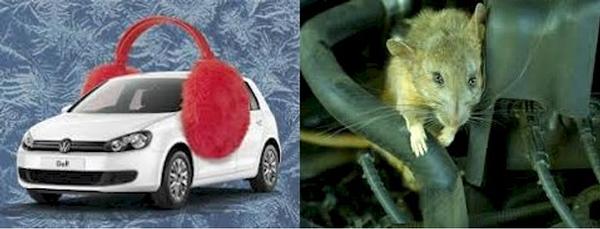Posted 11/10/2015 9:32 PM

It is that time of the year when all of our normally outdoor nesting critters start looking for indoor nesting areas and one of their favorite places is your car. Mice and sometimes squirrels travel into your cars Heater Ventilation and Air Conditioning system (HVAC) to build nests. They enter through the fresh air inlet door that opens to the outside of your vehicle. To avoid this, always set your HVAC system to the re-circulate mode when garaged or parked in the driveway. This closes the door access from these unwanted guests. This can happen overnight so don’t forget!
Also, while on the subject of HVAC, you should be aware that most late generation vehicles have cabin filters much like the HVAC filters in your house. Replace these filters on regular intervals, we recommend at least twice a year. We find some really ugly stuff in these filters at times especially after rodents have made nests from these filters.
WINTER PREP YOUR VEHICLE
As Winter is approaching there are a few things you should do to prepare your vehicle and your passengers in case conditions get ugly while on the road.
1. Ice Scraper
2. Bag or 2 of sand in tube format to better fit in trunk (20 lb. each is a great size, they will give extra weight for traction and can be spread on ice to help with wheel spin. Vehicles today with low aspect ratio tires are very susceptible to wheel spin on slippery surfaces.
3. Extra set of wiper blades
4. Flashlight and extra batteries
5. Blanket
6. Water and granola bars (sealed in plastic container) because the previously mentioned rodents will love the meal you left them when you forget to set HVAC to re-circulate mode.
7. Remember, when defrosting heavy ice from the windshield to pull your sun visor down to trap defroster heat to accelerate melting.
8. Keep your fuel tank full for these reasons:
a. Extra Weight
b. Less water contamination
c. Traffic stalled due to accidents or road conditions









